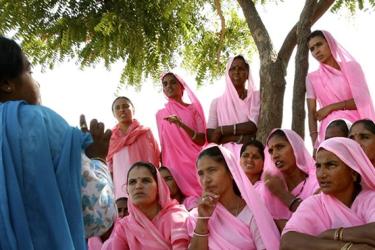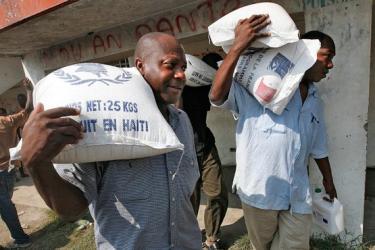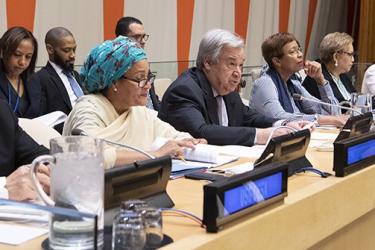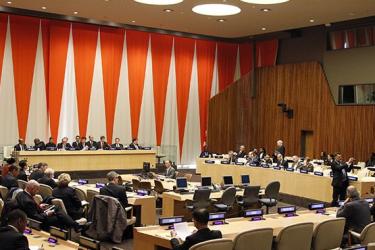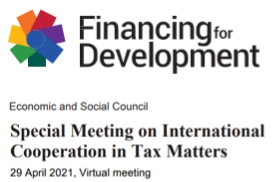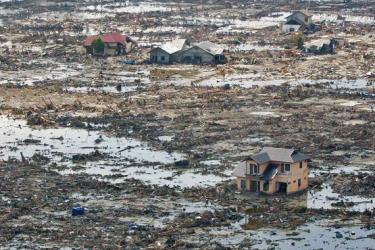The Economic and Social Council is at the heart of the United Nations system to advance the three dimensions of sustainable development – economic, social and environmental. It is the central platform for fostering debate and innovative thinking, forging consensus on ways forward, and coordinating efforts to achieve internationally agreed goals. It is also responsible for the follow-up to major UN conferences and summits.
The UN Charter established ECOSOC in 1945 as one of the six main organs of the United Nations.
Coordination within the UN
ECOSOC links a diverse family of subsidiary bodies and UN entities (Organigram) dedicated to sustainable development, providing overall guidance and coordination. These include regional economic and social commissions, functional commissions facilitating intergovernmental discussions of major global issues, expert bodies establishing important global normative frameworks, and specialized agencies, programmes and funds at work around the world to translate development commitments into real changes in people’s lives.
Reforms over the last decade, particularly General Assembly resolutions 68/1, 72/305 and 75/290 A, have strengthened ECOSOC’s leading role in identifying emerging challenges, promoting innovation, and achieving a balanced integration of the three pillars - economic, social and environmental- of sustainable development. The 2021 review, which was undertaken together with the resolutions on the High-level political forum on sustainable development (HLPF), bolstered ECOSOC’s Charter mandate as a coordinator, convener and specialized body for policy dialogue, policy-making and forger of consensus towards the implementation of the 2030 Agenda for Sustainable Development as well as other major UN /conferences and summits under its purview, the response to the COVID-19 pandemic and to address other major global challenges and new issues. Resolution 75/290A thus strengthened the coordination role of the Council, and it also reinforced its deliberative nature. Furthermore, resolutions 75/290A and 75/290B enhanced the coordination between the work of ECOSOC and the HLPF.
Partnership with the rest of the world
Building on its coordination role within the UN system, ECOSOC is a gateway for UN partnership and participation by the rest of the world. It offers a unique global meeting point for productive dialogues among policymakers, parliamentarians, academics, foundations, businesses, youth and 6,500 registered non-governmental organizations.
A spotlight on global issues
Each year, ECOSOC structures its work around an annual theme of global importance to sustainable development. This ensures focused attention, among ECOSOC’s array of partners, and throughout the UN development system.
By emphasizing combined economic, social and environmental concerns, ECOSOC encourages agreement on coherent policies and actions that make fundamental links across all three.
ECOSOC’s annual High-Level Segment includes:
- High-Level Political Forum provides political leadership, guidance and recommendations for sustainable development, and reviews progress in implementing sustainable development commitments.
- High-level Segment, held on an annual basis, represents the culmination of ECOSOC's annual cycle of work and convenes a diverse group of high-level representatives from Government, the private sector, civil society and academia.
Other segments, forums, and meetings encompass:
Segment
- Coordination Segment promotes the work of subsidiary bodies of ECOSOC and the UN system to implement the 2030 Agenda for Sustainable Development
- Humanitarian Affairs Segment strengthens coordination of UN humanitarian efforts
- Operational Activities for Development Segment provides overall guidance for UN funds and programmes
- Management Segment reviews reports of ECOSOC subsidiary and expert bodies; promotes UN system coordination on development issues; and considers special country or regional concerns
Forums
- Development Cooperation Forum reviews trends and progress in development cooperation
- Multi-stakeholder forum on science, technology and innovation for the Sustainable Development Goals discusses science, technology and innovation cooperation around thematic areas for the implementation of the sustainable development goals, congregating all relevant stakeholders to actively contribute in their area of expertise.
- Youth Forum brings youth voices into discussions on global policy-making on development issues of the day
- Partnership Forum encourages collaboration among Governments, businesses and foundations, non-governmental organizations, academia and Parliamentarians
- Forum on Financing for Development follow-up reviews the Addis Ababa Action Agenda, other financing for development outcomes and the means of implementation of the Sustainable Development Goals (SDGs).
Meetings
- ECOSOC Special Meeting on International Cooperation in Tax Matters provides an opportunity to address emerging issues of tax policy and administration.
- Special meetings to address global development emergencies or crises, to raise awareness and to serve as a high level policy platform for coordination of actors working on a specific situation.
 Welcome to the United Nations
Welcome to the United Nations 

